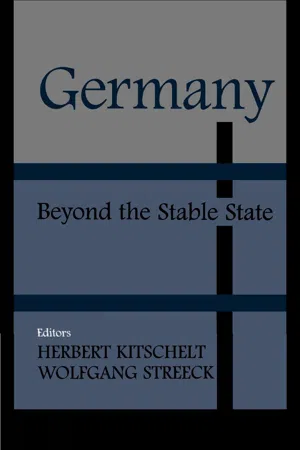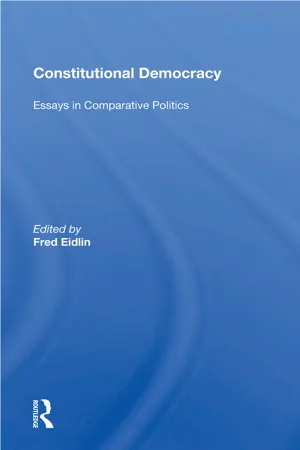History
Political Stability in Germany
Political stability in Germany refers to the country's ability to maintain a consistent and peaceful political environment. This stability is often associated with the strength of its democratic institutions, the effectiveness of its governance, and the absence of major political upheavals or crises. Germany's political stability has been a key factor in its economic success and its influential role in European and global affairs.
Written by Perlego with AI-assistance
Related key terms
Related key terms
1 of 4
Related key terms
1 of 3
3 Key excerpts on "Political Stability in Germany"
- eBook - ePub
Germany
Beyond the Stable State
- Herbert Kitschelt, Wolfgang Streeck(Authors)
- 2004(Publication Date)
- Routledge(Publisher)
Abstracts
From Stability to Stagnation: Germany at the Beginning of the Twenty-First Century, by Herbert Kitschelt and Wolfgang Streeck
Basic institutions and political power configurations that contributed to Germany’s post-war social and economic success turned from assets into liabilities in the 1990s and beyond. This introduction highlights the emergence and interaction of the critical components of the German political economy. It provides evidence for its declining performance and details a set of causes for it. Collective actors and institutional bargaining modes make it difficult to adapt to new challenges. Nevertheless, the deepening crisis may trigger change initiated by office-seeking party politicians and political-economic actors engaged in local problem-solving which sidesteps rigid mechanisms of national co-ordination.German Unification and ‘Model Germany’: An Adventure in Institutional Conservatism, by Helmut Wiesenthal
Germany today appears to be anything but the fortunate country it was on the eve of unification. The extension of model Germany to Eastern Germany has contributed to the predicament it has encountered in the emerging international political economic setting. The chosen mode of unification and its consequences have impaired the sustainability of the once cherished socio-economic order. Unification has made institutional reform both more urgent and more difficult. If major reform cannot be achieved without an external shock, a redistribution of political jurisdictions in favour of the Länder level could perhaps prove a feasible path to better performance.Germany and European Integration: A Shifting of Tectonic Plates, by Charlie Jeffery and William E.Paterson
This article explores the interaction of German domestic politics with the European integration process. It argues that institutions of European integration were a stabilising force for the West German state. But West German engagement with Europe went further. As a persistent demandeur - eBook - ePub
Constitutional Democracy
Essays In Comparative Politics
- Fred Eidlin(Author)
- 2019(Publication Date)
- Routledge(Publisher)
The intrusion of the new concept into German political science and German politics has shed new light and brought a new focus upon a debate that has accompanied German politics since the beginning of the new experiment in democracy after World War II. It centered around the question of whether the newly established democracy of Bonn was-with regard to its institutions-efficient and stable enough to maintain itself and whether-with regard to political culture- the German people really had espoused democratic values and could be relied upon in their respective attitudes and behavior. There can be little doubt that Germany's second attempt to establish a liberal democracy was much more successful than the first one during the 1920s, which ended in fascist totalitarianism. It can likewise be demonstrated that on the level of institutions, including the party and pressure-group system, the Federal Republic of Germany has achieved a comparatively high level of efficiency and stability, but German and foreign observers have always been somewhat distrustful about the democratic reliability of the German people, that is, about Germany's political culture. They continue to remain skeptical about the civic quality of Germany's political culture and refuse to believe in the democratic strength of its political culture before the system has really come under heavy stress, be it through a deep economic depression or through other external challenges. It is in this context that studies dealing with the political beliefs and attitudes of Germans have always attracted public interest within and outside of Germany, because they were supposed to give substantial information about the German people's democratic potential in times of crisis.Yet, despite a number of different studies undertaken in the new field of political culture, despite continuous observation of political opinions and attitudes through surveys, it is still difficult to give a reliable answer to the intriguing question of whether the German people have learned the lessons of democracy for good.Political culture is viewed here as a land of democratic reserve potential - eBook - ePub
German politics today
Third edition
- Geoffrey Roberts(Author)
- 2016(Publication Date)
- Manchester University Press(Publisher)
2007 ).Four claims can justifiably be asserted with regard to the political system of the Federal Republic. It is, first, a democratic political system, which enjoys a great deal of acceptance by, and support from, its citizens and indeed admiration from other countries, as demonstrated by institutional imitation in Austria, Spain, Italy, New Zealand and Scotland, among other examples. While there are indications that support for democracy has declined in both eastern and western Germany since reunification, it is the output of democracy, rather than the democratic regime itself, which is viewed critically (Campbell, 2010 , pp. 583–4).Second, it is a stable system, with an arsenal of weapons with which to defend its democratic constitutional order (‘combative democracy’). At the governmental level, ruling coalitions have tended to last for long periods, compared either to those of the Weimar Republic or to those of other democracies today. Chancellor Kohl’s government replaced SPD-FDP coalitions which had lasted thirteen years; Kohl was replaced after sixteen years in office. Following Chancellor Schröder’s two terms as head of an SPD-Green coalition government, Chancellor Merkel has governed since 2005, though leading two grand coalitions interspersed with a coalition with the FDP. No serious attempt has been made to replace the democratic regime, either by peaceful or violent means. In 1968 the radicalism of the student movement and intellectuals brought a swift response from the authorities, including passage of legislation and constitutional amendments to protect the regime in an emergency situation. The terrorism of the Red Army Faction was met by generalised public revulsion, not mass revolution, and by swift and effective government counter-measures, including more rigorous legislation to combat terrorist threats. Hopes on the part of radical Greens and ‘post-materialists’ that a more open form of government could replace the orthodox and elite-based procedures of the Federal Republic were met by adaptation and reform, but not by change of regime. So when German reunification occurred in 1990, there was but little support for the idea of replacing the tried and tested Basic Law by a new constitution, even though the Basic Law itself had allowed for precisely that possibility in its Article 146.
Index pages curate the most relevant extracts from our library of academic textbooks. They’ve been created using an in-house natural language model (NLM), each adding context and meaning to key research topics.
Explore more topic indexes
Explore more topic indexes
1 of 6
Explore more topic indexes
1 of 4


